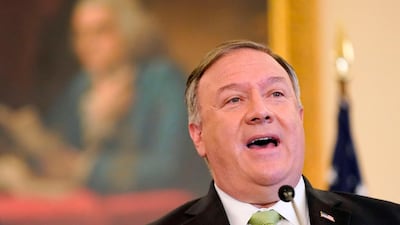Snapback UN sanctions reimposed by the US earlier this week on Iran are unlikely to have any “meaningful” impact on the country’s energy sector, whose exports have already been squeezed by Washington’s maximum pressure policy, analysts say.
On Saturday, US Secretary of State Mike Pompeo said sweeping new sanctions targeting the Islamic Republic’s nuclear, missile and conventional arms would come in force after a UN arms embargo on Iran was reimposed “indefinitely”.
This follows the US’ exit from the Joint Comprehensive Plan of Action in 2018 - an important election promise of current US President Donald Trump.
His administration has since embarked on a policy to squeeze Iran’s exports to zero, as a measure to curb Tehran’s ability to fund what it sees as proxy conflicts in the region.
"UN sanctions are not targeting the energy sector, per se," said Homayoun Falakshahi, oil and gas equity analyst at Kpler. "The UN was really focused on Iran’s nuclear and missile programmes.”
Meanwhile, Opec member Iran has seen its oil production and exports fall dramatically as a result of the US’ maximum pressure campaign. Estimates by London-based Facts Global Energy suggest that Iran’s production has halved falling from 3.8 million barrels per day before sanctions to just below 1.9m bpd. Its exports, which averaged 2m bpd prior to the US sanctions against Tehran now average 200,000 bpd.
The Iranian regime continues to export oil, under different flag carriers and using ship-to-ship transfers.
"For crude oil, the main two destinations for the cargoes which can be tracked are Syria and China. Syria we don’t think is paying. It's more of a help,” said Iman Nasseri, FGE managing director - Middle East.
In terms of exports from Iran, Mr Nasseri says the crude cargoes are receipts for Chinese investment in oil fields in the country.
China’s trade war with the US, also forced Beijing to consider sanctions against Iran lightly and has continued to trade with Tehran.
"Some other cargoes might have ended up in other Southeast Asia but for crude it's very unlikely because it's easily traceable,” said Mr Nasseri. Iran uses its own fleet of National Iranian Tanker Company vessels to offload its crude, he added.
The latest set of sanctions have been opposed by the E+3 group of nations, which includes the UK, France and Germany, who are all parties to the JCPOA, which was signed during the presidency of Barack Obama.
The states have questioned the legality of imposing UN sanctions against Iran, saying that Washington lacked the authority to unilaterally impose snapback sanctions against Tehran, after it left the JCPOA in 2018.
While the UN, including Secretary General Antonio Guterres debate the legality of the latest round of sanctions, analysts said the snapback could embolden the US to crack down further on Iranian oil exports.
“The US could potentially use what just happened as an excuse to do something. So for example they could seize Iranian cargoes transporting oil or petroleum products,” said Mr Falakshahi.
He cited the US seizure of tankers carrying Iranian gasoline for Venezuela in August as an example of possible new measures against Tehran.
Mr Nasseri, who acknowledged that US maximum pressure strategy has exerted enormous hardship on Iran’s government, economy and people, is unlikely to squeeze oil exports to zero.
Meanwhile, Iran, which only became a net gasoline exporter in February 2019, after the inauguration of the third 120,000 bpd phase of its Bandar Abbas Gas Condensate Refinery, has begun exporting gasoline to neighbouring Iraq, Afghanistan and Pakistan.


